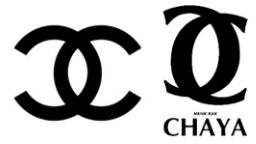- within International Law, Law Department Performance and Consumer Protection topic(s)
In this article, we'll be looking at four recent cases that deal with the issue of confusing similarity between trade marks. When you've finished reading this you may well think - good heading! We'll start in the EU.
European Union Intellectual Property Office ("EUIPO")
Philadelphia v Vegandelphia: cancellation
There is an EU trade mark registration for Vegandelphia. The trade mark appears in the colour green and in a stylised script. The letter "i" is represented by a leaf device, and the words "by Yogan" appear in a much smaller script below the word. The registration is in class 29 and it covers goods such as cream spreads, fats, vegetable oils and vegetable extracts. It is owned by a Portuguese company called Costa and Casimio.

Source: The intellectual property planet
The registration for Vegandelphia was challenged by the US company, Intercontinental Brands, on the basis of several EU, Portuguese and Spanish trade mark registrations for the word mark Philadelphia. These registrations are also in class 29 and they cover goods such as cream cheese, oils and fats. The US company claimed a reputation for the trade mark, and alleged that the Portuguese company was seeking to take advantage of their earlier trade mark.
The EUIPO made a number of points:
- The goods covered by the two trade marks are identical or similar.
- The trade marks themselves are reasonably similar, both phonetically and visually, although conceptually they are very different, with one being the name of a well-known US city.
- With strong sales and market shares in many EU countries, together with significant advertising, the trade mark Philadelphia has a repute.
- Delphia may, as claimed, be a personal name, but there was not much evidence that many people have or know this name.
- The fact that the first element of the later mark Vegandelphia is descriptive is relevant to the enquiry.
The EUIPO concluded that confusion was likely and that Vegandelphia could take unfair advantage of the repute enjoyed by Philadelphia. It held that Vegandelphia could well be seen as a vegan variant of Philadelphia. The application for cancellation was therefore upheld.
Japan
Zahara v Zara - opposition
A Japanese company called Zahara Beauty Co. Ltd filed an application to register the trade mark Zahara in Japan in various classes, namely:
- class 3 for cosmetics and related goods
- class 35 for retail services relating to beauty products
- class 41 for beauty arts instruction
- class 44 for beauty salons
This application was opposed by the company Inditex on the basis of registration for the trade mark Zara. Inditex claimed that its trade mark Zara enjoys a repute and is a famous trade mark.
But Inditex's opposition failed. The Trade Marks Office held that the two trade marks were not confusingly similar, and that they could be easily distinguished. They were also not convinced that the trade mark Zara is famous and well-known by consumers of the goods and services in question.
Coco Chanel, Interlocking C devices: opposition
A company called HCO Co Ltd filed an application to register a trade mark comprising an interlocking C logo above the words Chaya and Music Bar in class 43 for restaurant services. Coco Chanel, the owner of a famous interlocking C logo, filed an opposition.
The attack was based on the repute of the "prestigious" trade mark Chanel, a repute created through huge advertising and revenue, and the alleged likelihood of confusion. Coco Chanel argued that, given the repute of the Chanel trade mark, one could infer that the new trade mark had been filed with intention to deceive or cause confusion.
The Opposition Board of the Japanese Patent Office ("JPO") accepted that the Coco Chanel trade mark has a reputation, yet it found that there was no likelihood of confusion given the visual differences. Which, when you look at the representations below, sounds about right!

Source: Marks IP
The Philippines
Louis Vuitton v Soriano: opposition
Businessman, Phillip Victor Martin Soriano, filed an application to register a trade mark comprising a LV logo in class 3 for cosmetics. The application was opposed by the company Louis Vuitton Malletier, which claimed that:
- Louis Vuitton is known as LV
- The company has a number of trade mark registrations in the country (although not in class 3)
- The trade mark enjoys a repute
- There is a likelihood of confusion
Soriano contested the opposition arguing that the LV in his trade mark refers to the surname of one of his relatives, Old Lopez-Vito.
The case went the way of Mr Soriano. The hearing officer held that there was no likelihood of confusion, given the marked differences as regards both the trade marks and the goods of interest. The hearing officer made the point that Louis Vuitton had failed to prove any repute or notoriety in the Philippines. The hearing officer seemingly regarded the fact that Soriano's product was not a luxury product but a cheap one as relevant. Unsurprisingly, Louis Vuitton has filed an appeal.
Perhaps you're thinking, "I'm sure I know the name Soriano." If you read our articles regularly, you probably do. In 2020, there was an issue between this gentleman and Prince Harry, who opposed a trade mark application that Soriano had filed for the trade mark Archewell Harvatera for cosmetics. This opposition was based on Harry's brand Archewell.
As we said in the heading, it does sometimes seem like a bit of a lottery.
The content of this article is intended to provide a general guide to the subject matter. Specialist advice should be sought about your specific circumstances.


